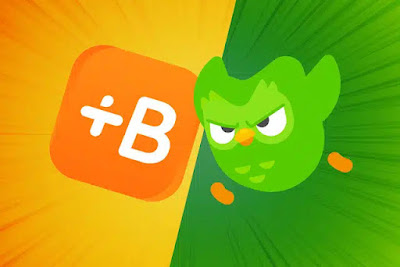After 1001 consecutive days--almost three years of studying--I quit Duolingo.
Okay, so it wasn't quite consecutive. Anyone who's used Duolingo long enough knows that after a certain number of lessons, they allow you to buy streak freezes. Break your streak for just a day or two and they'll keep it going the day after that.
Still, over the last three years, I think I've only used streak freezes three times. So yeah, that's a lot of studying.
I started with Spanish, but quickly switched over to my true lingua amata, Italian. It took me two years to complete all the lessons, which at the time was arranged in the shape of a tree (you could choose lessons from several units in the next level, but you had to complete a minimum number of lessons in any one level before moving on to the next). And then I went through the entire tree again to earn the Legendary trophy for each unit.
Meanwhile, I also played around with other languages, either because of earlier interest, as with German (I passed my fourth-year German class in college--just barely--and now remember almost none of it), or because of newly gained passions (Greek, French, Norwegian).
Dissing Duo
Duolingo gets slammed a lot. Some critics say its instructional format leads to poor retention of the language you're learning. That may be true, but then that's true of all language tools if you don't use them.
Others complain that the sentences are useless in practical situations. Who can forget Non so se lei abbia usato un coltello o una bottiglia. or, in English, I don't know whether she used a knife or a bottle (compared to the other languages, the Italian unit has a disturbingly large number of sentences like this).
This is also true. But the point of learning a language isn't to memorize a list of common phrases that you think you'll use again and again. It's to learn how the language works and to be able to form sentences--any sentences--that you might need.
In praise of the owl
On the other hand, Duolingo doesn't get nearly enough credit for the things it does well. First of all, it's completely free. Yes, they hit you up for a paid membership, but its benefits are minimal and you can access every one of their languages and lessons without it and without any annoying advertising.
And let's admit it. Duolingo is a lot of fun. The short lessons, the gamified format, and yes, those goofy sentences, all lead to a truly enjoyable learning experience, one I looked forward to every day.
Finally, Duolingo is effective. After completing the Italian course, I found I was able to understand 30% of the written language (at least the simplified Italian of websites and blogs) and maybe 10% of the spoken language. Nowhere near fluent, but it was a start.
The competition
In comparison, Babbel is boring and repetitive, making you prove you've learned a single word or phrase through a seemingly endless array of exercises before moving onto new words or phrases (never to return again). Pimsleur only seems to care about how the pronounce the words. Rosetta Stone doesn't even offer a free trial.
Of all the competitors, the little-known Busuu is the closest to Duolingo in providing a fun, effective way to learn a language. The lessons are short, offer an interesting array of topics, and get you into real-life conversations quickly. And you can access 100% of their material for free--as long as you're willing to watch one brief video ad per unit.
The one drawback to the app is that it's fairly buggy. I guess sometimes you do get what you pay for.
Test driving these other tools opened my eyes to one important and widely overlooked fact. Duolingo is the only major language tool that has you translate new, complete sentences into your target language. There are hundreds of them and they are repeated at random and infrequent intervals so that you can't rely on your short-term memory to recall them. You have to understand how the language works.
It's also the only tool that fully explains the grammar rules behind the sentences. And it's the only tool that provides forums where language learners can ask questions about vocabulary, grammar, and pronunciation and have hem answered by other learners as well as native speakers.
Scratch that...
Duolingo was the only tool that offered those last two benefits. But earlier in this year, they decided to drop their original lesson structure--in which you could choose which aspect of the language you wanted to study (e.g pronouns, adverbs, the past perfect tense)--to a single path from which you could not deviate and which scattered those specific aspects around in a seemingly haphazard fashion. They also grossly slimmed down most of their tutorials.
That's why I quit.
I don't know why they made those changes. I think they wanted to copy their competitors, but in doing so, they got rid of the things that made them better, and it made me mad. It made a lot of Duolingo loyalists mad. Some of them even started a petition in an attempt to force them to return to the previous format.
And a lot of of them, like me, quit.
Besides which, Duolingo is all about becoming minimally conversant in a large number of languages. It really doesn't provide the tools or the motivation to improve your competency in a particular language once you've completed its track.
Well before I quit Duolingo, I'd spread out to other tools, and hose have enabled me to boost my reading and listening comprehension rates to 90% and 50%. Here are the best:
1) Coffee Break Languages Podcasts
There are a ton of language learning podcasts out there, but Coffee Break Languages is head and shoulders above the rest. What sets it apart is that it avoids the didactic approach of other podcasts, in which a single teacher recites phrases which you're expected to repeat and memorize.
Instead each 30-minute episode of this Scotland-based podcast is a conversation among three people: a language learner (Katy in the first season of the Italian podcast, Isla in the second), a teacher (native speaker Francesca), and a facilitator (Mark, the founder of Coffee Break Languages), who keeps things loose and very, very lively. They start from zero, with the learner knowing nothing about Italian, but soon has her--and you--participating in simple conversations.
Later seasons dump the learner and focus on Francesca and Mark, which allows them to cover more advanced topics (e.g. the dreaded subjunctive!).
Currently, Coffee Break offers just eight languages (the major European languages plus Mandarin and Gaelic), but their coverage of those languages is surprisingly deep. If you want, you can buy a full subscription to the website, which gives you access to a wealth of additional learning materials such as lesson notes and videos.
But if you're cheap like me and you opt out, you'll still learn a lot.
2) Instagram
One of the best things about social media is the huge number of native speakers in any language (and I do mean any language) who've been able to carve out a full-time gig for themselves teaching their language to others.
Some speak slowly so that beginning learners can practice their listening comprehension skills. Others speak faster to provide a challenge for more advanced learners. And almost all of them provide subtitles, although whether you want them in English or just your target language will depend on where you are in your own journey.
In Italian, my current favorites are
Peratoons, a series of short, jokey animated cartoons, and
BRAVO! Italian with Paola, in which the oh-so-charming host offers a humorous approach to some of the quirks of the Italian language.
Try a bunch of them. Like everything on Instagram, it's as easy to unfollow as it is to follow. And the more you do follow, the more will be recommended to you.
Many of the accounts also offer private online lessons for a moderate fee ($30 to $50 a month).
Of all the tools, these have helped me boost my listening comprehension the most.
3) Other podcasts
Now that I've caught up to the hundred and somethingth episode of Coffee Break Italian, I've branched out into other podcasts which are presented 100% in la bella lingua. Like the Instagram accounts, they cover a variety of topics of interest to language learners, but with their episodes running twenty to thirty minutes, they can cover a lot more ground and in a lot more detail.
Lately, I've been listening to
Italian Con Amore on my drive to work because I find Eleonora, the host, extremely engaging as she covers a wide variety of topics, everything from coffee shop etiquette to Italian cinema, gardening in Italy to the country's constitution. My one complaint? She talks super fast!
(Hint: If you have problems understanding your favorite language learning podcast, just decrease the playback speed in your podcast app.)
4) Quizlet
At some point, you're going to understand all of the basic grammar rules of your target language, and the only way to become fully fluent is to learn new words. A lot of them. Like four or five thousand.
How can you do this quickly and (relatively) painlessly? With this flash card app. It's free, but it does bombard you with a lot of useless notifications.
I haven't signed up for the paid version, but this is one that may be worth it as it's relatively cheap ($3 a month) and gives you access to different games that promise to make learning even more fun.
Wrapping it up
So there you have it. Four ways to help you learn your favorite new language. And you don't even need to spend any money. All you really need is time and a strong enough passion for your target language so that you won't give up when the going gets tough. Because you know it will.
Stupid subjunctive.
UPDATE: On August 31, Duolingo updated many of the courses, adding new sentences throughout the path but in turn removing much of the progress students have made. In Italian, that had the effect of kicking me back to the end of 34 units out of 43. That could be frustrating, but it does mean I can start again from where it kicked me back, making the rest of the path seem fresh and new again. I'm excited!
I mean, sure a lot of the sentences are the same. But it never hurts to review a language you're learning (especially since I still get one or two sentences per unit wrong). And seeing the progress I make each day--in my knowledge of the language as well as in the little colored steps on the path--is a nice motivator.





































